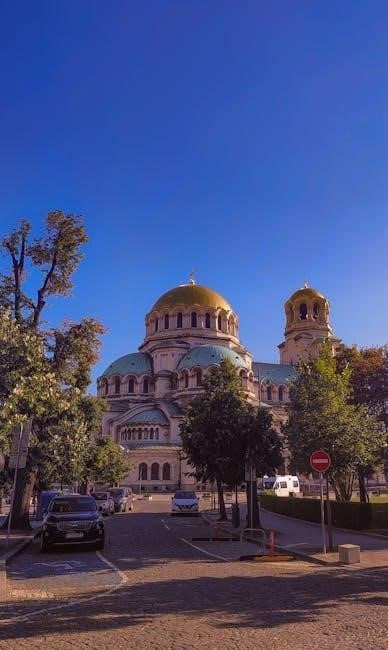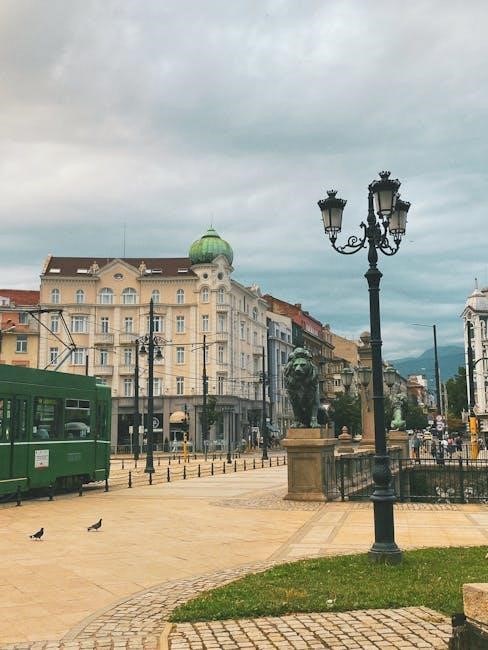Overview of the Novel
El Mundo de Sofía, a philosophical novel by Jostein Gaarder, explores existential themes through Sofía’s journey, widely read as a PDF for its educational insights globally․
El Mundo de Sofía, written by Jostein Gaarder, is a philosophical novel that follows the journey of Sofía Amundsen as she discovers the history of philosophy․ The story seamlessly blends fictional narrative with philosophical concepts, making it both engaging and educational․ The book has gained global popularity, and its availability in PDF format has made it easily accessible for readers worldwide, enhancing its educational and cultural impact․
Importance of the PDF Format
The PDF format of El Mundo de Sofía is widely popular due to its accessibility and convenience․ It allows readers to easily download and share the novel, making it a preferred choice for students and educators․ The digital version ensures global reach, enabling readers worldwide to explore Sofía’s philosophical journey without physical constraints, enhancing its educational and cultural impact significantly․
The Author: Jostein Gaarder
Jostein Gaarder is a Norwegian author and philosopher, known for his thought-provoking works․ Born in 1952, he taught philosophy before gaining fame with El Mundo de Sofía․
Biography and Literary Career
Jostein Gaarder, born in 1952 in Oslo, Norway, is a renowned author and philosopher․ Before becoming a full-time writer, he taught philosophy and history of ideas․ His novel El Mundo de Sofía became a global bestseller, transforming his career․ Known for blending philosophy with storytelling, Gaarder has written numerous novels and children’s books, earning him international acclaim and a dedicated readership․
Philosophical Themes in His Works
Jostein Gaarder’s works, including El Mundo de Sofía, delve into existential questions, the nature of reality, and ethics․ His narratives often explore complex philosophical concepts, making them accessible to a broad audience․ Themes of self-discovery, the environment, and the search for meaning are central to his writing, resonating with readers seeking deeper understanding of life and human existence․
Plot Summary
El Mundo de Sofía follows Sofía, a young girl who receives mysterious letters introducing her to philosophical concepts․ Her journey explores existential questions, history, and human understanding․
Main Characters and Their Roles
Sofía Amundsen is the protagonist, a curious teenager exploring philosophy․ The Philosopher guides her through mysterious letters, introducing her to philosophical concepts․ Jorunn, Sofía’s friend, contrasts with Sofía’s deep thinking․ Sofía’s father plays a minor role, influencing her worldview․ These characters shape Sofía’s journey of self-discovery and philosophical awakening, making the story engaging and thought-provoking․
Key Philosophical Questions Explored
The novel delves into fundamental philosophical questions, such as the meaning of life, existence, and identity․ It explores the nature of reality, free will, and whether humans can truly know the world․ These questions are presented through Sofía’s journey, making complex ideas accessible and engaging, particularly for young readers seeking deeper understanding of life’s big questions․

Historical and Cultural Context
El Mundo de Sofía reflects Western philosophical traditions, blending historical ideas with contemporary themes․ Jostein Gaarder’s Norwegian roots add cultural depth, while the PDF format enhances global accessibility and educational reach․
Influence of Philosophy on the Narrative
El Mundo de Sofía masterfully intertwines philosophical concepts with its narrative, creating a thought-provoking journey․ Jostein Gaarder’s background in teaching philosophy and history of ideas is evident, as he weaves together influential thinkers and existential questions into Sofía’s experiences․ The PDF format has made this exploration of philosophy accessible to a global audience, fostering deeper engagement with the text’s intellectual and emotional layers․
Cultural Relevance and Reception
El Mundo de Sofía has achieved global acclaim, resonating across cultures due to its universal themes of self-discovery and existential inquiry․ The PDF format has facilitated its widespread accessibility, making it a favorite among diverse readers․ Its philosophical depth and relatable narrative have cemented its status as a culturally significant work, transcending age boundaries and inspiring both young and adult readers worldwide․
Educational Value
El Mundo de Sofía is widely recognized for its educational value, introducing complex philosophical concepts in an accessible manner․ The PDF format enhances its suitability for academic use, making it a popular resource for teaching critical thinking and the history of philosophy in schools and universities worldwide․
Use in Academic Settings
El Mundo de Sofía is frequently utilized in educational institutions for its unique approach to teaching philosophy․ The PDF version is particularly popular among teachers and students due to its accessibility and ease of sharing․ It serves as a valuable resource for introducing key philosophical concepts, fostering critical thinking, and encouraging discussions on existential themes in classroom settings․ Its clear narrative structure makes complex ideas relatable for young learners․
Impact on Young Readers
El Mundo de Sofía has profoundly inspired young readers by introducing them to philosophy in an engaging, accessible manner․ The PDF format has made it easier for adolescents to explore complex ideas, fostering curiosity and critical thinking․ Its relatable protagonist and thought-provoking narrative have empowered young minds to question existence and seek meaning, making it a cherished resource for intellectual and personal growth․
Availability and Popularity
PDF Downloads and Online Access
El Mundo de Sofía is widely available as a PDF, making it easily accessible worldwide․ Its popularity endures, with numerous downloads and translations ensuring its global reach․
El Mundo de Sofía is readily available as a PDF, with multiple sources offering free downloads․ Platforms like Docsity and Scribd provide easy access, while its popularity is evident from numerous downloads worldwide․ The PDF format ensures portability, making it a favorite among readers seeking philosophical insights․ Its global reach is further enhanced by translations, catering to diverse audiences and solidifying its educational appeal․
Translations and Global Reach
El Mundo de Sofía has been translated into numerous languages, ensuring its philosophical themes resonate worldwide․ Its availability in Russian, Spanish, and other languages highlights its global appeal․ The novel’s popularity extends beyond Norway, making it a beloved read in many countries․ PDF versions further enhance accessibility, allowing readers worldwide to engage with Sofía’s journey and the exploration of existential questions in diverse cultural contexts․

Themes and Symbolism
El Mundo de Sofía delves into existentialism and self-discovery, using Sofía’s journey to explore life’s meaning․ Nature and the garden symbolize growth and philosophical awakening, enriching the narrative․
Existentialism and Self-Discovery
El Mundo de Sofía explores existentialism through Sofía’s philosophical journey, prompting readers to question life’s meaning․ Her self-discovery mirrors existentialist ideals, emphasizing personal growth and understanding․ The novel’s narrative, available widely in PDF format, encourages global readers to reflect on their own existence, making it a timeless guide for philosophical inquiry and introspection․
The Role of Nature and the Environment
Jostein Gaarder emphasizes the importance of nature through Sofía’s interactions with her surroundings․ The novel highlights the interconnectedness of human existence and the environment, reflecting Gaarder’s concern for planetary health․ Available widely in PDF, the story underscores the urgency of environmental stewardship, aligning with Gaarder’s advocacy for sustainable action․ Nature serves as both a backdrop and a philosophical catalyst in Sofía’s journey․

Critical Reception
Positive Reviews and Acclaim
El Mundo de Sofía has received widespread acclaim for its unique approach to philosophy, making complex ideas accessible․ Readers praise its engaging narrative and intellectual depth․
El Mundo de Sofía has been widely praised as a groundbreaking philosophical novel․ Readers and critics acclaim its ability to simplify complex ideas, making philosophy accessible to a broad audience․ The book’s engaging narrative and depth have made it a cult classic, resonating with both young and adult readers worldwide․ Its educational value and timeless themes continue to inspire new generations․
Criticisms and Controversies
Some critics argue that El Mundo de Sofía oversimplifies complex philosophical concepts, potentially misleading readers․ Others find the narrative structure dense and challenging to follow․ Despite its popularity, debates arise about its suitability for younger audiences due to its depth and complexity, sparking discussions about balancing accessibility with intellectual rigor in philosophical literature․
Philosophical Concepts
El Mundo de Sofía delves into fundamental philosophical ideas, exploring the nature of existence, reality, and knowledge, offering readers a foundational understanding of key philosophical theories and concepts․
El Mundo de Sofía introduces readers to central philosophical concepts, tracing the evolution of thought from ancient Greeks to modern existentialism․ Through Sofía’s journey, Gaarder simplifies complex theories, making them accessible to a broad audience while encouraging deep reflection on existence, reality, and human purpose, blending education with storytelling to provoke critical thinking and curiosity about life’s fundamental questions․
Connection to Real-World Issues
El Mundo de Sofía connects philosophical concepts to real-world concerns, such as environmental degradation and human responsibility․ Gaarder’s narrative highlights the urgency of addressing global issues, reflecting his advocacy for planetary health․ The novel’s themes resonate with contemporary debates on sustainability and ethical living, inspiring readers to reflect on their role in shaping the future and fostering a deeper connection to the world around them․

Comparisons with Other Works

El Mundo de Sofía is often compared to other philosophical novels like Sophie’s World, sharing themes of existential inquiry and self-discovery, yet offering a unique narrative style that sets it apart from similar works․
Similarities with Other Philosophical Novels
El Mundo de Sofía shares thematic similarities with works like The Alchemist and The Little Prince, exploring existential questions and self-discovery․ Its unique blend of philosophy and storytelling mirrors novels that educate while engaging readers, making it a standout in the genre․ The PDF format has enhanced its accessibility, contributing to its global popularity and educational value․
Unique Aspects of “El Mundo de Sofía”
El Mundo de Sofía stands out for its unique narrative approach, blending philosophy with a young protagonist’s personal journey․ The novel’s ability to simplify complex philosophical concepts while maintaining depth sets it apart from other works․ Its mysterious guide and historical references create a captivating storyline, making it both educational and engaging․ The PDF format has further amplified its accessibility and global reach, ensuring its timeless appeal to diverse audiences․

Future Perspectives
El Mundo de Sofía remains highly relevant, offering timeless philosophical insights․ Its PDF availability ensures continued accessibility, inspiring future adaptations and engaging new generations in its exploration of existential themes․
Continued Relevance in Modern Times
El Mundo de Sofía remains a timeless exploration of philosophy and self-discovery, resonating with contemporary readers․ Its themes of existentialism and environmental consciousness, particularly highlighted by Gaarder’s advocacy, continue to inspire․ The PDF format ensures accessibility, making it a popular choice for new generations seeking philosophical insights in a digital age․
Potential for New Adaptations or Sequels
El Mundo de Sofía holds potential for new adaptations or sequels, exploring unresolved philosophical questions or expanding on minor characters․ Its timeless themes and digital accessibility via PDF could inspire fresh interpretations, appealing to modern audiences while preserving its intellectual depth and emotional resonance․
Final Thoughts on the Novel’s Significance
El Mundo de Sofía remains a timeless exploration of philosophy, inspiring readers to reflect on existence and knowledge․ Its availability in PDF ensures accessibility, fostering continued dialogue and introspection across generations․
El Mundo de Sofía stands as a profound exploration of philosophy, offering timeless insights into existentialism and self-discovery․ Its widespread availability in PDF format has made it accessible globally, ensuring its continued relevance in fostering critical thinking and intellectual curiosity across diverse audiences, from students to lifelong learners, solidifying its place as a modern philosophical cornerstone․
Encouragement for Further Exploration
El Mundo de Sofía invites readers to delve into its rich philosophical tapestry, sparking curiosity and reflection․ Its availability in PDF format makes it easily accessible for deeper exploration, encouraging readers to engage with its timeless themes and explore the historical and cultural contexts that shape its narrative, fostering a lifelong journey of intellectual growth and discovery․